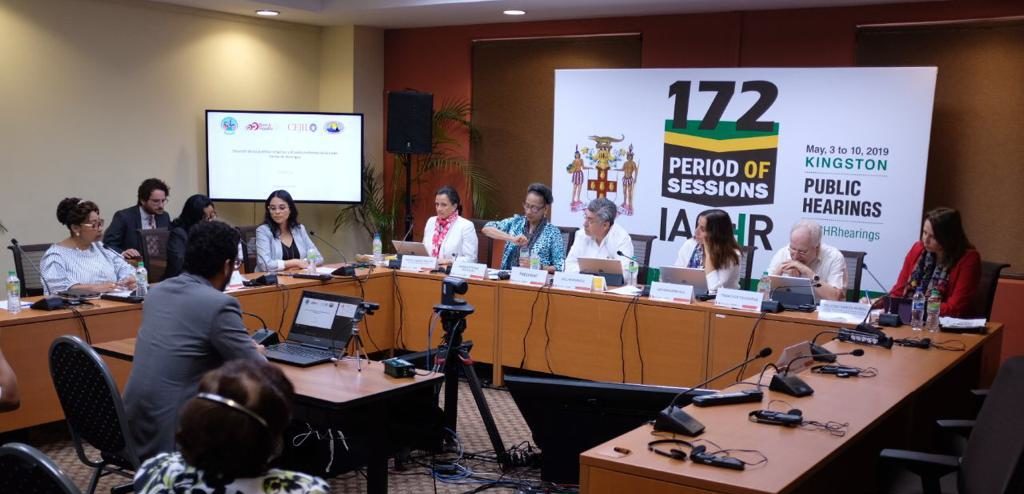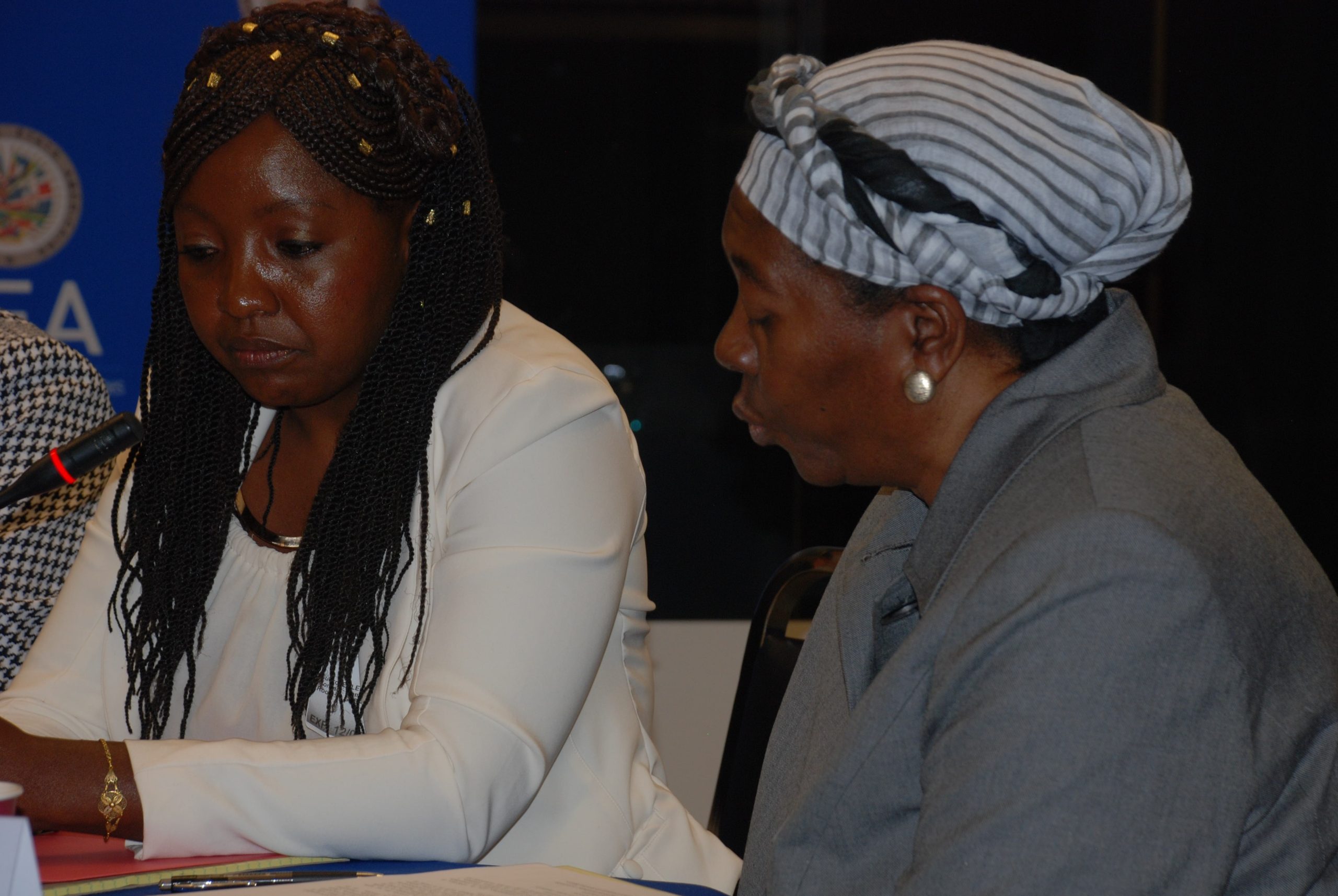Human rights defenders denounce the context of serious violence faced by Indigenous and Afro-descendant people of the Nicaraguan Caribbean
Jamaica, May 8, 2019. The indigenous and Afro-descendant communities of the Caribbean Coast of Nicaragua are facing a serious situation of violence as a result of the invasions of ancestral […]

Jamaica, May 8, 2019. The indigenous and Afro-descendant communities of the Caribbean Coast of Nicaragua are facing a serious situation of violence as a result of the invasions of ancestral territories by settlers, human rights defenders denounced today before the Inter-American Commission on Human Rights (IACHR), during its 172nd period of sessions.
Lottie Cunningham of the Center for Justice and Human Rights of Nicaragua’s Atlantic Coast (CEJUDHCAN, for its initials in Spanish), explained that the conflict between indigenous people and settlers has had “devastating consequences,” because it has impacted rights to integrity, health, food, access to water, a healthy environment, cultural identity, and a decent life. Furthermore, this situation has resulted in the forced displacement of indigenous communities, seriously affecting their traditional ways of life.
The hearing entitled “Situation of the Indigenous and Afro-descendant people of the Caribbean Coast of Nicaragua” was also attended by Ana Bolaños of the Institute on Race, Equality and Human Rights (Race and Equality); Nora Newball of the Creole Government of Bluefields and the Alliance of Indigenous and Afro-descendant People of Nicaragua (APIAN, for its initials in Spanish); and Esteban Madrigal of the Center for Justice and International Law (CEJIL). The State of Nicaragua, which was invited to participate in the event, did not attend.
Context of the conflict
The Atlantic Coast of Nicaragua is a multi-ethnic, pluricultural and multilingual region where nearly 508,000 people with origins from the Mískitu, Sumu/Mayangnas, Rama and Afro-descendant (Creoles and Garífunas) communities live.
Nora Newball from Bluefields, comments about the situation of afrodescendants in #Nicaragua presented today before the @IACHumanRights in #Jamaica: "as afrodescendant people, we're not visibilized in our country". pic.twitter.com/PS8r6sAA3D
— Race and Equality (@raceandequality) May 8, 2019
This territory “has been ravaged for years by poverty and by a systematic violation of the right to ancestral territories,” said Ana Bolaños, attorney at Race and Equality. As a result of a ruling of the Inter-American Court of Human Rights in 2005, the State of Nicaragua approved Law 445, which established a process of demarcation and titling of these communities’ lands.
Under this law, between 2007 and 2016, 23 territories benefiting 304 indigenous and Afro-descendant communities were demarcated, but the title-clearing process has not been carried out, which is the State guarantee to the indigenous people of “the effective use and enjoyment of their titled territories when faced with their occupation by third parties or settlers.”
In the absence of this process, the settlers, mostly ex-soldiers operating under the Nicaraguan State’s tolerance, extract the natural assets of the communities for marketing purposes.
Despite the fact that the IACHR granted precautionary measures in favor of 12 communities on the Northern Caribbean Coast of Nicaragua and that the Inter-American Court of Human Rights ordered the State to adopt measures to guarantee the life, integrity, territory and cultural identity of seven of these communities, “as of today, there has yet to be an effective response from the State,” according to activists.
Increase in violence
Cunningham warned that violent actions by settlers have increased lately. For example, in February, two women from the community of Santa Clara were kidnapped by 25 armed settlers and forced to work cleaning beans under threat of death.
CEJUDHCAN has documented that between 2011 and 2018, a total of 34 community members have been killed, 44 injured, 25 kidnapped, and four disappeared in the context of the conflict.
Additionally, Cunningham said that the violence has generated a food crisis for members of the communities who cannot access their plots or perform other activities such as hunting and fishing. “In that sense, it has affected maternal health, access to education, and hindered access to the basic means necessary to sustain a dignified life,” the activist added.
According to a study conducted by CEJIL and CEJUDHCAN in 2018, about 23% of children on the Caribbean Coast of Nicaragua suffer from chronic malnutrition and approximately 11% suffer from severe chronic malnutrition.
However, the acts of violence continue with impunity. Out of 65 complaints filed by CEJUDHCAN with the corresponding authorities, 49 were rejected.
Political participation neutralized
Nora Newball, representative of APIAN, an alliance created in 2015 to demand and monitor human rights violations against indigenous and Afro-descendant people, explained to the IACHR Commissioners that the State of Nicaragua has neutralized the civic and political leadership of its people and has installed parallel communal governments.
“In the recent regional elections (of 2019), the participation of the indigenous and ethnic population has decreased due to the high levels of invasion of settlers. 95.5% of councilors belong to national parties and only 4.5% belong to the indigenous party,” Newball said.

The human rights defender and political leader also highlighted that the State has seriously damaged forests and natural resources, with the deforestation caused by the Alba-Forestal company and the imposition of the Interoceanic Grand Canal. The private sector has also affected their communities through the expansion of the African palm, the advancement of the agricultural frontier, extensive cattle raising, and an increase of mining activity and fishing.
Request
Members of the civil society asked the IACHR and the international community to take all the necessary actions to stop the invasion of the territories in the Caribbean Coast of Nicaragua and to ensure respect for the human rights of indigenous and Afro-descendant people.
In particular, they requested the IACHR to demand that the State of Nicaragua immediately cease the repression against indigenous and Afro-descendant people and the human rights defenders who participated in the hearing; to include this situation in Chapter IV(B) of its annual report; and to request the Follow-up Mechanism of Nicaragua (MESENI, for its initials in Spanish) to monitor the situation of indigenous and Afro-descendant people.
In addition, they asked the IACHR to urge the State of Nicaragua to establish a dialogue with the traditional authorities to implement the title-clearing process of the territories and to comply with the protection measures ordered for indigenous and Afro-descendant people, as well as to demand that the State of Nicaragua guarantee the right of indigenous people to choose their authorities according to their traditions and customs.
IACHR interested in visiting the Caribbean
After listening to the interventions of human rights defenders, the Rapporteur on the Rights of Afro-descendants and against Racial Discrimination, Commissioner Margarette May Macaulay, expressed her intention to visit the Caribbean Coast of Nicaragua to “talk to the people, to make this situation more visible and more palpable.” She stressed that her visit would depend on the consent of the State, but remarked: “I hope to and I have the plan to do it if I can.”
The First Vice-President of the IACHR, Joel Hernández, assured that the Commissioners took note of the petitions raised by civil society and stressed that their role is key “in a context of a serious human rights situation, where an absence of the State and where the access to justice has dissipated.”
Other rapporteurs of the IACHR who were present at the hearing, including the Rapporteur for Nicaragua, Antonia Urrejola, and the Rapporteur on Economic, Social, Cultural and Environmental Rights, Soledad García Muñoz, showed a high level of interest in learning details about the situation of the indigenous and Afro-descendant people of the Caribbean Coast of Nicaragua.

